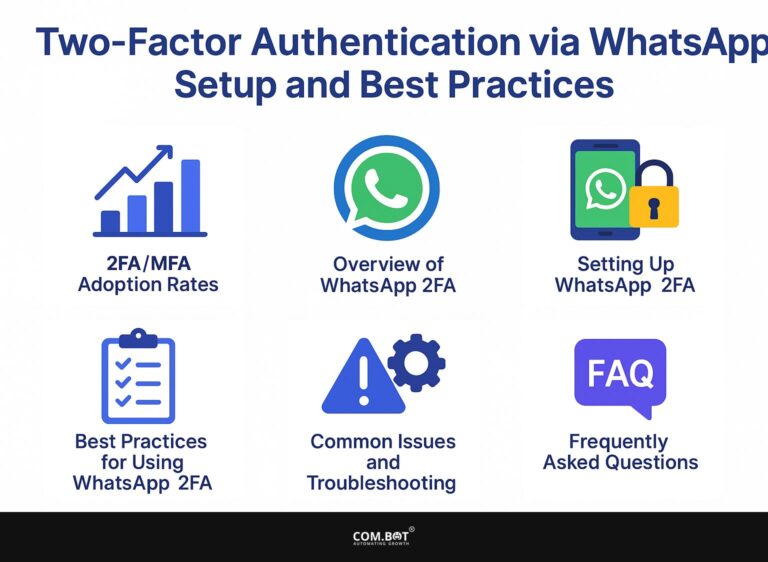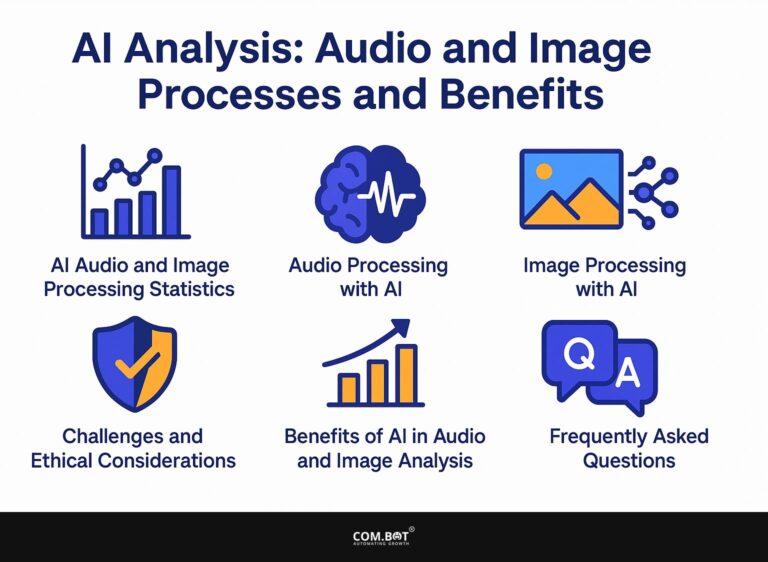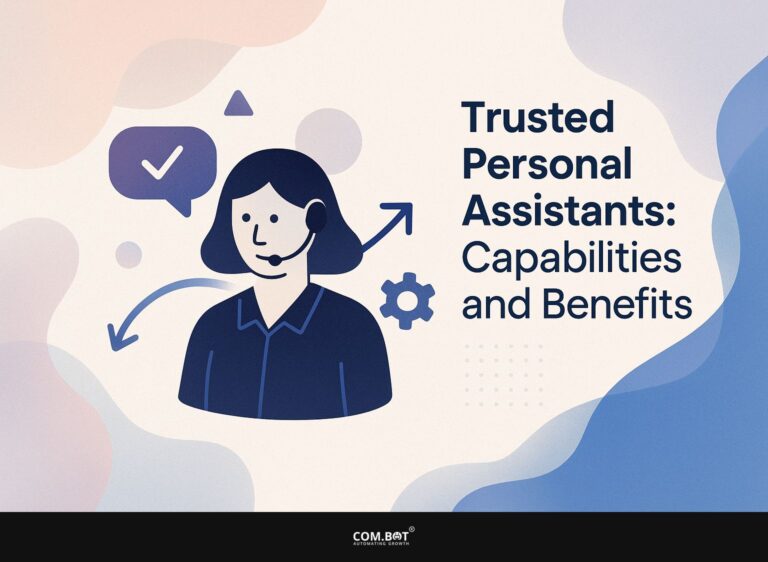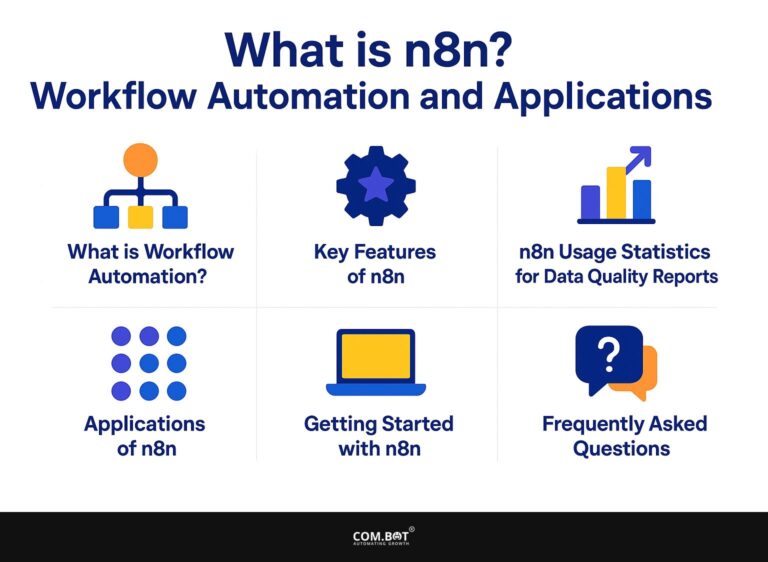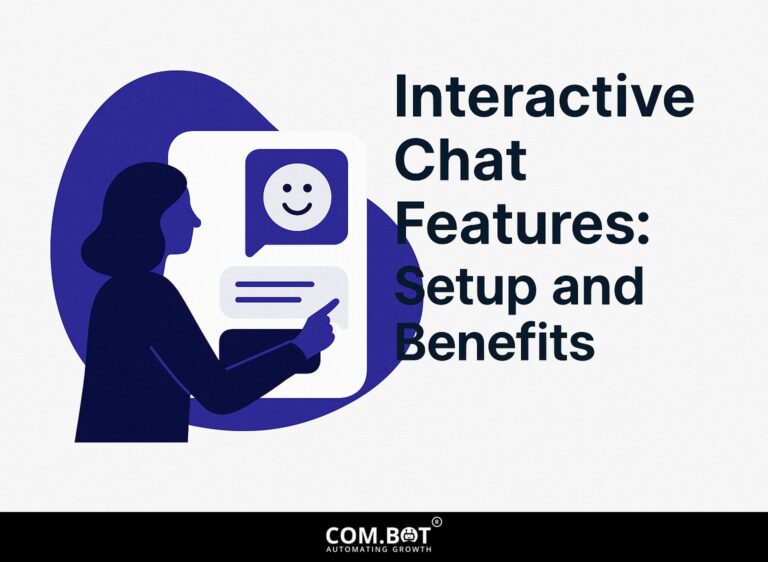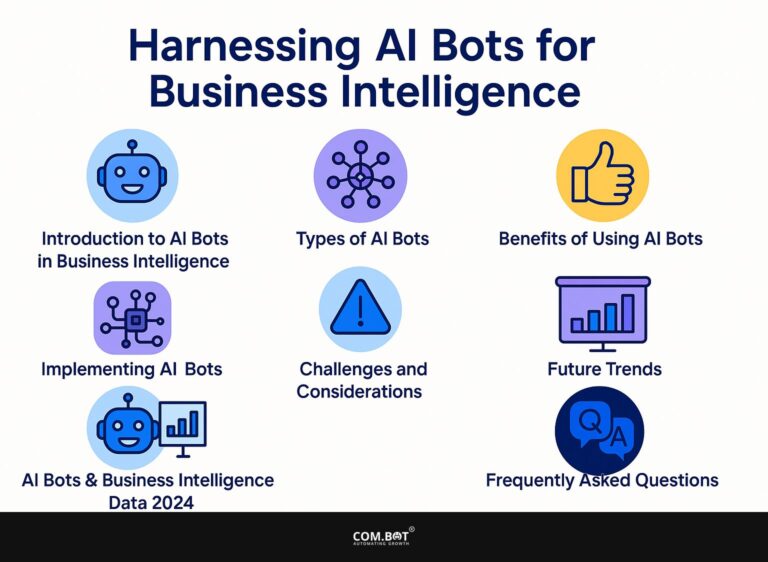AI WhatsApp Bots: Boosting E-commerce Sales and Business Communication
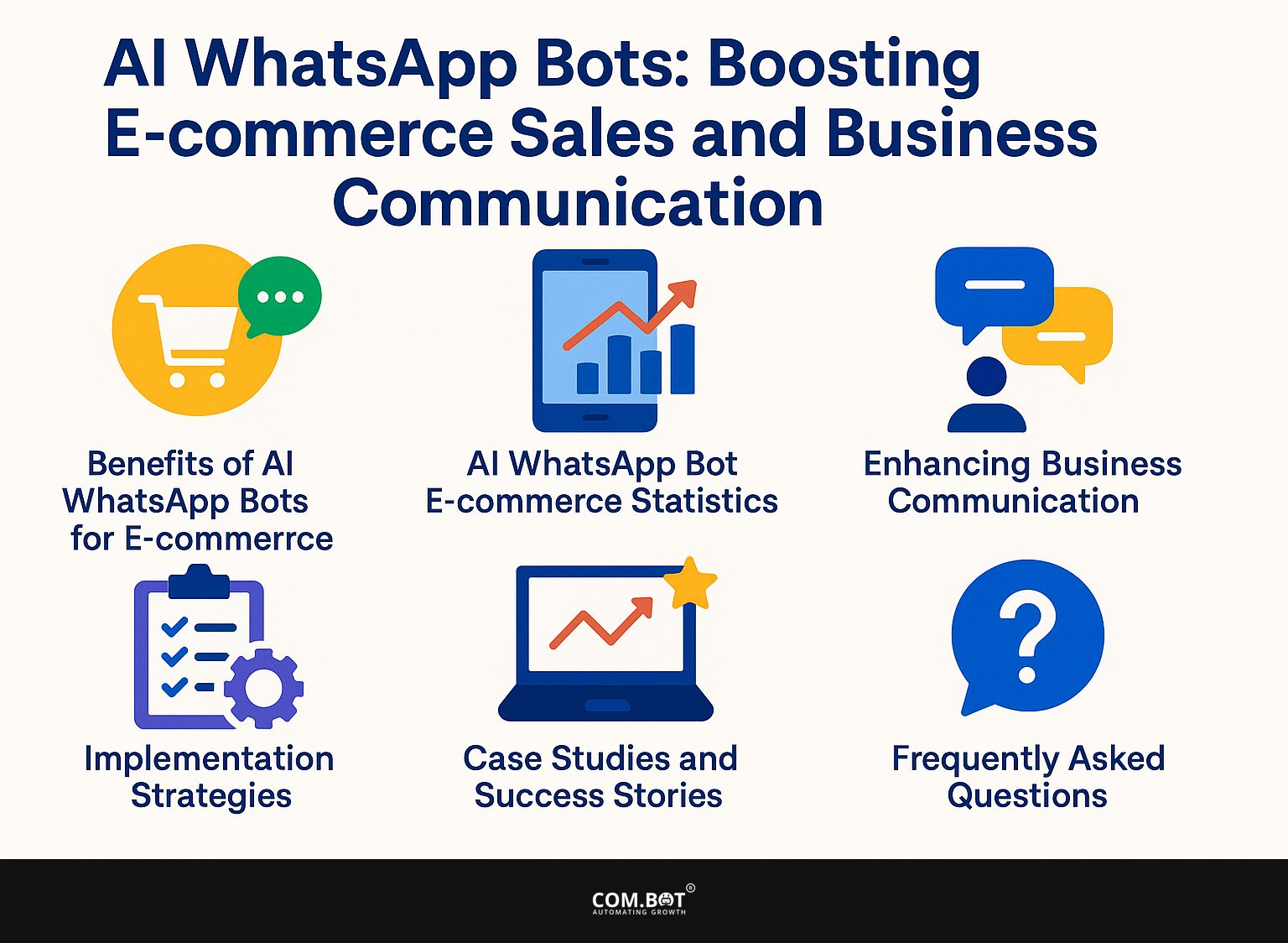
Use AI WhatsApp bots to greatly increase your e-commerce sales and improve how your business communicates. More and more customers want quick help, adding a chatbot on WhatsApp can change the way you interact with them.
This article talks about how these tools provide 24/7 customer support, customize shopping experiences, and make internal communication better. Learn how using WhatsApp bots can help your business grow.
Key Takeaways:
- AI WhatsApp bots offer around-the-clock customer help, a customized shopping experience, and order tracking for online stores, resulting in higher sales and happier customers.
- These bots make internal communication more efficient and automatically reply to typical questions, improving business communication and productivity.
- To successfully implement AI WhatsApp bots, businesses must choose the right platform and integrate it with existing systems. Upcoming changes involve advancements in chatbot technology and possible problems to solve.
- 1 Benefits of AI WhatsApp Bots for E-commerce
- 2 AI WhatsApp Bot E-commerce Statistics
- 3 Enhancing Business Communication
- 4 Implementation Strategies
- 5 Case Studies and Success Stories
- 6 Future Trends in AI and E-commerce
- 7 Frequently Asked Questions
- 7.1 1. What are AI WhatsApp bots and how do they improve e-commerce sales and business communication?
- 7.2 2. How can AI WhatsApp bots improve the customer experience in e-commerce?
- 7.3 3. What features do AI WhatsApp bots offer for e-commerce businesses?
- 7.4 4. Are AI WhatsApp bots suitable for all types of e-commerce businesses?
- 7.5 5. Are AI WhatsApp bots secure for handling sensitive customer information?
- 7.6 6. How can businesses get started with AI WhatsApp bots for their e-commerce operations?
1. Definition and Purpose
AI WhatsApp Bots are tools in WhatsApp that are set up to automatically respond to customer questions. This makes replies faster and boosts user engagement. These bots use natural language processing (NLP) to understand and respond precisely to customer inquiries.
For example, a brand could use tools like Twilio to easily connect, enabling the bot to respond to common questions about products or services.
Setting up a bot typically involves defining intent using platforms like Dialogflow, which helps in training the bot to recognize various customer inputs. By setting up an AI WhatsApp Bot correctly, businesses can cut down response time to seconds, which improves customer satisfaction.
2. Importance in E-commerce
AI WhatsApp Bots play a key role in online shopping by increasing sales and improving customer satisfaction. Data shows that they can increase conversion rates by up to 30%. These bots help businesses interact with customers at any time, quickly answering questions and guiding them through buying.
An example is Zara, which used an AI bot to offer product suggestions specific to each user based on their actions on the site. This kept customers returning. Integrating tools like Twilio’s API enables seamless communication and order tracking.
The overall effect is a smoother shopping process that can lower the number of unfinished purchases and improve customer commitment.
Benefits of AI WhatsApp Bots for E-commerce
AI WhatsApp Bots offer major benefits for online stores, such as better customer support and customized shopping experiences.
AI WhatsApp Bot E-commerce Statistics
To enhance these benefits, exploring capabilities like abandoned cart recovery can be transformative to online businesses. Related insight: Com.bot’s Abandoned Cart Recovery Bot provides a strategic advantage by targeting missed opportunities in sales.
AI WhatsApp Bot E-commerce Statistics
In exploring AI WhatsApp Bot E-commerce Statistics We should think about how AI-driven chatbots can change online shopping. This dataset doesn’t give exact numbers, but we can examine the general trends and effects of using AI WhatsApp bots in e-commerce.
AI WhatsApp Bots are changing how businesses talk to customers by providing instant and customized communication. This technology uses AI to quickly understand and answer customer questions, improving user experience and building customer loyalty. Let’s examine the impacts and potential benefits of AI WhatsApp bots in e-commerce:
- Customer Engagement: AI WhatsApp bots allow immediate and personalized interaction with customers, giving them quick answers to their questions. Rapid response is important for keeping customers happy and involved.
- 24/7 Availability: Unlike human counterparts, AI bots offer round-the-clock service, ensuring that customer queries are addressed at any time, thus improving the overall customer experience.
- Operational Efficiency: By automating customer interactions, businesses can significantly reduce the workload on customer service teams, allowing human resources to focus on more complex tasks that require personal intervention.
- Data Collection and Insights: AI bots can collect useful data on customer preferences and behaviors, helping create specific marketing plans and improve products.
The integration of AI WhatsApp bots into e-commerce platforms is set to change customer service standards, improving speed and tailoring experiences to individual needs. As businesses keep putting money into AI technologies, AI communication tools will play a key role in shaping e-commerce.
1. 24/7 Customer Support
AI WhatsApp Bots provide customer support at all times by replying to questions immediately, which decreases the reliance on human workers. Companies using AI WhatsApp Bots have seen a big rise in customer satisfaction.
For instance, a retail brand noted that its bot effectively manages over 500 inquiries daily, leading to a 30% reduction in response time. Using a bot with Twilio’s WhatsApp API makes it easy to set up automatic replies for typical questions, like checking order status or learning about return policies.
Apps like WhatsApp Analytics help companies improve their communication. These tools make sure customer needs are answered quickly, allowing human agents to handle more detailed questions.
2. Personalized Shopping Experience
By examining what users like, AI WhatsApp Bots can provide customized product suggestions, improving the shopping experience. These bots use customer information like previous buys, browsing records, and feedback to improve their recommendations.
For example, QuickReply allows businesses to set up their bot to look at conversations and suggest products that fit each person’s needs. This method raises user satisfaction and makes conversions more likely.
Using loyalty program information helps create customized discounts, which keeps customers coming back. Over time, as the bot learns from ongoing interactions, its recommendations will become even more aligned with each user’s preferences.
3. Order Tracking and Management
AI WhatsApp Bots simplify order tracking, allowing customers to receive real-time updates about their purchases directly on WhatsApp. Adding order tracking to your online store, like Shopify, greatly improves customer happiness.
By automating notifications about order status changes, customers can remain informed without needing to check their email. Tools like ‘Track123’ provide seamless integration with Shopify, sending updates via WhatsApp that include shipment tracking links.
With Shopify’s Order Tracking app, customers can easily monitor their orders as they happen. This increases clarity and reduces questions, letting your team concentrate on urgent customer issues.
Enhancing Business Communication
AI WhatsApp Bots help businesses improve communication within the company, simplify workflows, and encourage better teamwork. For an in-depth understanding, see also: AI WhatsApp Bots: Definition, Benefits, and Use Cases.
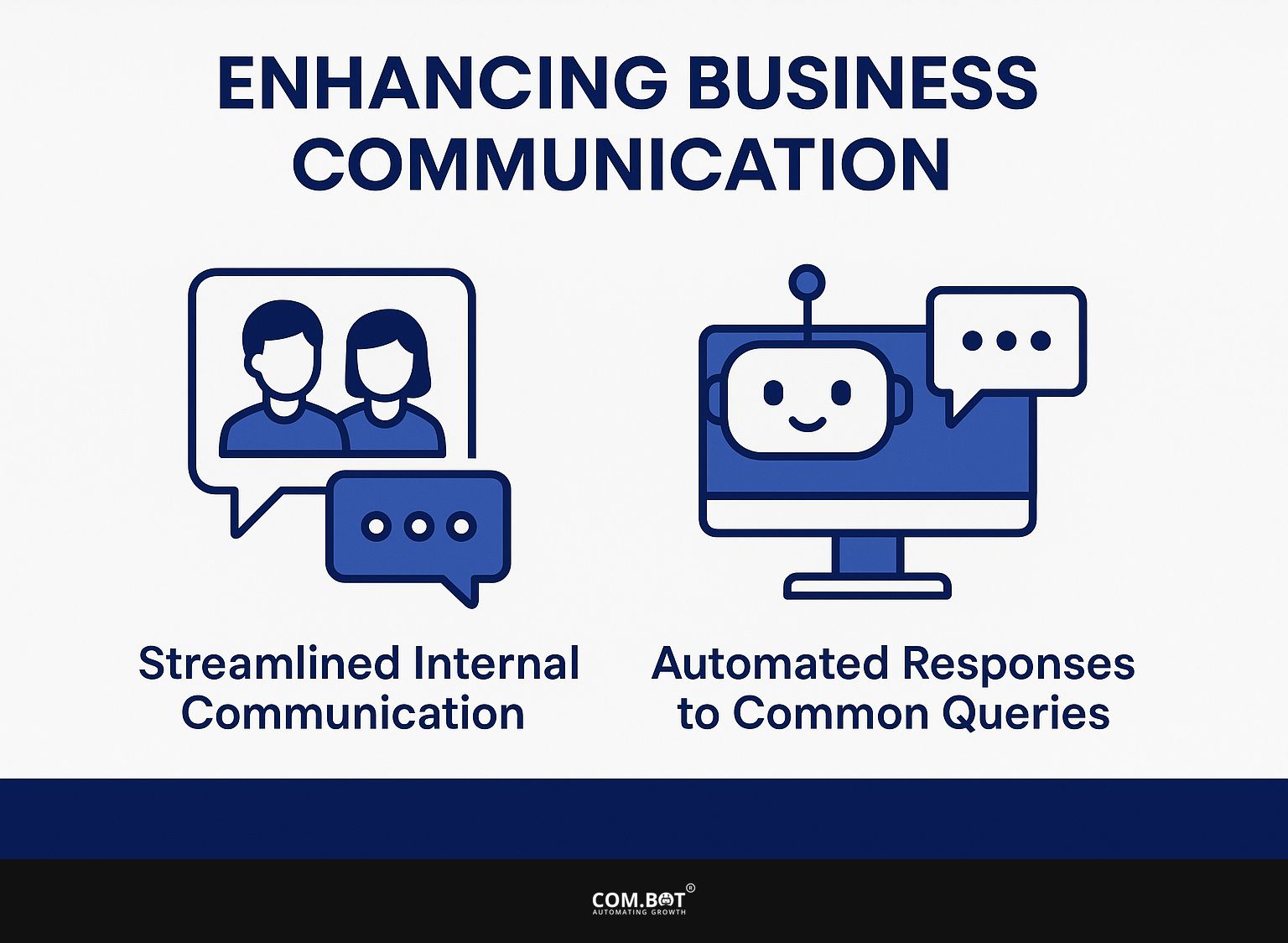
1. Streamlined Internal Communication
WhatsApp Bots allow teams to quickly share updates and work together, cutting down on the need for long email threads and increasing how much gets done.
For instance, using a WhatsApp Bot to send daily standup notifications lets a team share updates consistently, reducing meeting duration by 30%.
Tools like Twilio for WhatsApp integration can facilitate this, enabling seamless communication. Using analytics features can track response times and engagement levels, revealing a 40% increase in team interaction. In the end, these improvements save time and help create a workplace that can adjust and react quickly.
2. Automated Responses to Common Queries
Using automatic replies for typical questions can greatly cut down wait time, letting teams handle more complicated problems.
To make useful automatic responses for WhatsApp Bots, begin by reviewing frequently asked questions from customers-find repeated themes by looking at past chats. Next, create clear response templates addressing these common questions, ensuring they’re concise and helpful.
Tools like Twilio or WhatsApp Business API facilitate integration; they allow you to implement these templates seamlessly. Regularly change your answers to match new questions so they stay useful. This proactive method improves customer happiness and makes your team’s tasks easier.
Implementation Strategies
Setting up AI WhatsApp Bots needs careful planning to choose the correct platform and make sure they work smoothly with current systems. For those interested in a comprehensive approach, our step-by-step guide on creating a WhatsApp AI Chatbot provides detailed insights on integrating these technologies effectively.
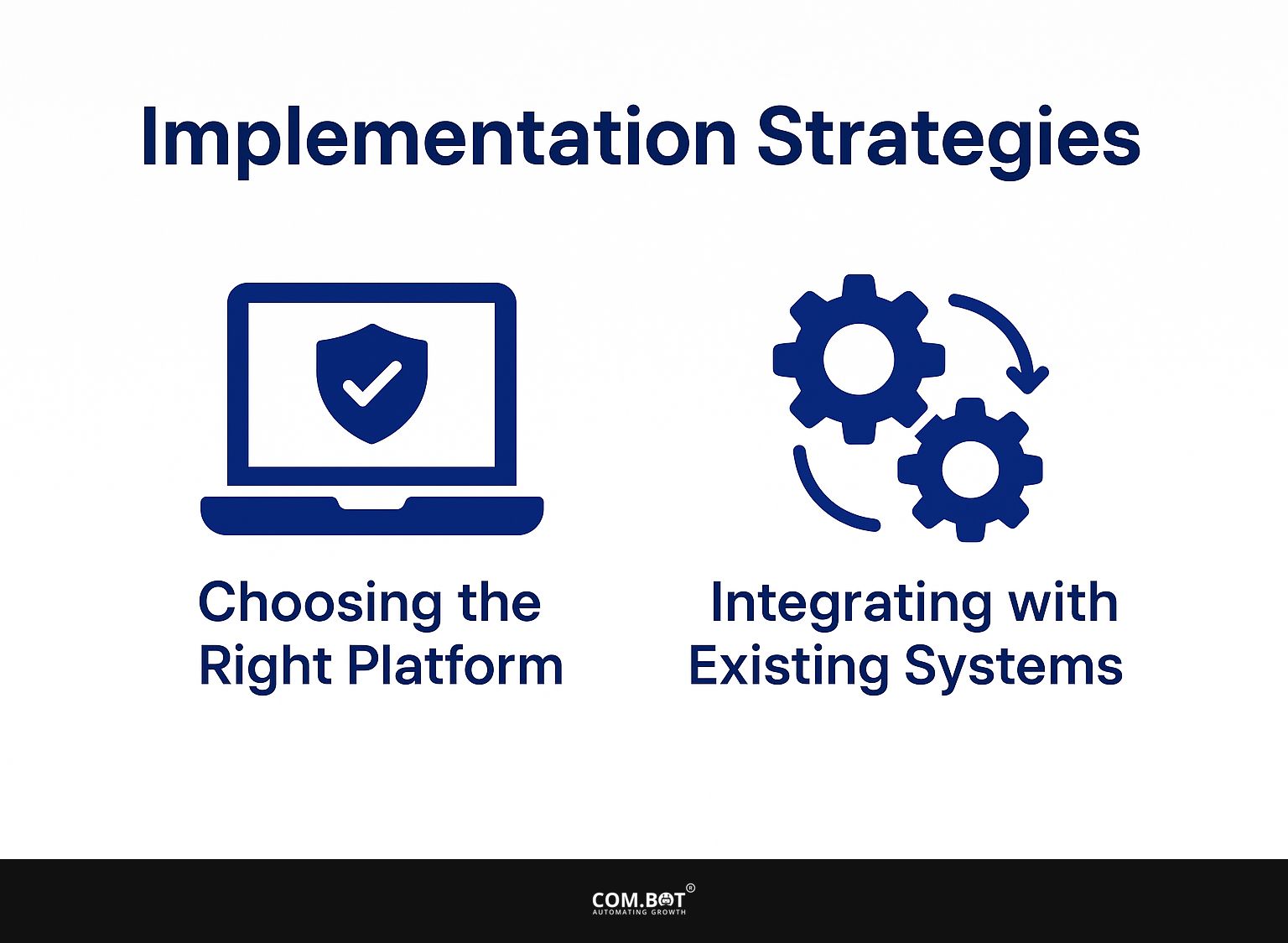
1. Choosing the Right Platform
Choosing the right platform for your AI WhatsApp Bot is important. Options such as Twilio and QuickReply provide different features and pricing plans.
Twilio costs $0.0075 for each message, providing a cost-effective option for sending many messages, and has reliable API links. QuickReply, on the other hand, focuses on user-friendly tools with a starting price of $15/month, ideal for small businesses.
Consider your message volume, user interaction level, and integration needs. If you need easy CRM connection, Twilio is a good choice. QuickReply is better for those who want a simple setup with less coding.
2. Integrating with Existing Systems
Connecting AI WhatsApp Bots with existing systems can improve features, allowing for order handling and interaction with customers. To set up an AI WhatsApp Bot successfully, use the APIs that come with your online store platform, like Shopify or WooCommerce.
For instance, utilizing the Twilio API facilitates easy communication and order status updates through WhatsApp. Consider middleware solutions like Zapier to connect disparate systems without extensive coding.
Successful brands focus on customer support needs. For example, Sephora uses WhatsApp for appointment bookings and product inquiries, which greatly increases interaction.
Case Studies and Success Stories
Looking at examples of companies using WhatsApp Bots shows useful information on successful methods and clear results. For those interested in understanding the broader potential of this technology, one of our most insightful case studies delves into the definition, benefits, and use cases of AI WhatsApp Bots.
Brands Successfully Using WhatsApp Bots
Companies like Master of Code Global have successfully used WhatsApp Bots, resulting in a 40% increase in customer engagement and satisfaction.
In the same way, the online store H&M started using WhatsApp Bots for better customer service by using the Twilio platform to automatically reply to common questions and help with tracking orders. This implementation led to a 30% decrease in customer service response times.
Another example is DHL, which uses a WhatsApp Bot for shipment updates, resulting in improved delivery tracking and increased customer trust. Both brands show how using WhatsApp Bots can make communication easier and greatly improve customer satisfaction.
Future Trends in AI and E-commerce
AI and online shopping are changing quickly, with new developments in chatbots expected to change how customers interact. I recently came across Com.bot’s 24/7 AI Support Bot that highlights how these innovations are making customer service more efficient and accessible.
1. Innovations in Chatbot Technology
Innovations such as natural language processing and sentiment analysis are enhancing chatbot capabilities, allowing for more human-like interactions.
For example, companies like Sephora use AI chatbots to give customized product suggestions. These chatbots use natural language processing to effectively interpret customer questions.
H&M’s chatbot uses sentiment analysis to measure how happy users are and changes its replies based on this. These improvements make it easier for customers to interact and simplify the support procedures.
Businesses can build personalized chatbots using tools such as Dialogflow or Microsoft’s Bot Framework. These chatbots improve how users interact with the service, resulting in better retention and satisfaction rates.
2. Potential Challenges and Solutions
AI WhatsApp Bots offer many advantages, but businesses need to handle issues like data privacy and following regulations. To address privacy concerns, companies should use compliance tools such as OneTrust and TrustArc. These tools help manage consent and data protection regulations.
It’s also essential to implement best practices, such as clearly defining data usage policies and obtaining explicit user consent before interactions. Regularly checking and changing these policies helps keep them in line with current rules.
Businesses can build a clear FAQ section about data usage on their websites to ease customer worries and build trust. By focusing on compliance, organizations can use WhatsApp Bots effectively without facing legal problems.
Frequently Asked Questions
1. What are AI WhatsApp bots and how do they improve e-commerce sales and business communication?
AI WhatsApp bots are chat programs that automatically talk to customers on WhatsApp using artificial intelligence. They can increase online sales by helping customers with their purchases and giving custom suggestions. They also improve business communication by providing quick and efficient responses to customer inquiries.
2. How can AI WhatsApp bots improve the customer experience in e-commerce?
AI WhatsApp bots can make shopping better by offering round-the-clock help, suggesting products based on customer preferences, and quickly answering customer questions. This makes the buying process more convenient and efficient for customers, leading to increased satisfaction and potentially higher sales.
3. What features do AI WhatsApp bots offer for e-commerce businesses?
AI WhatsApp bots provide different tools for online stores, like automatic product suggestions, keeping track of orders, and easy payment setup. They can answer customer questions, give immediate help, and gather useful customer information for businesses to study and adjust their plans.
4. Are AI WhatsApp bots suitable for all types of e-commerce businesses?
Yes, AI WhatsApp bots can be beneficial for all types of e-commerce businesses, from small startups to large corporations. They can be customized to fit the specific needs of each business and their customers. With the increasing popularity of messaging apps like WhatsApp, implementing AI bots can give businesses a competitive edge and improve their sales and customer communication.
5. Are AI WhatsApp bots secure for handling sensitive customer information?
Yes, AI WhatsApp bots are designed with security in mind, and measures are in place to protect sensitive customer information. They use end-to-end encryption to make sure all messages and data are safe. Companies can decide to control what data the bots can access and add more security steps if required.
6. How can businesses get started with AI WhatsApp bots for their e-commerce operations?
Businesses can get started with AI WhatsApp bots by researching and selecting a reputable bot provider, such as Zendesk or Chatfuel. They can then work with the provider to customize and integrate the bot into their e-commerce platform. Companies should train their staff on how to use the bot properly for sales and talking with customers.
